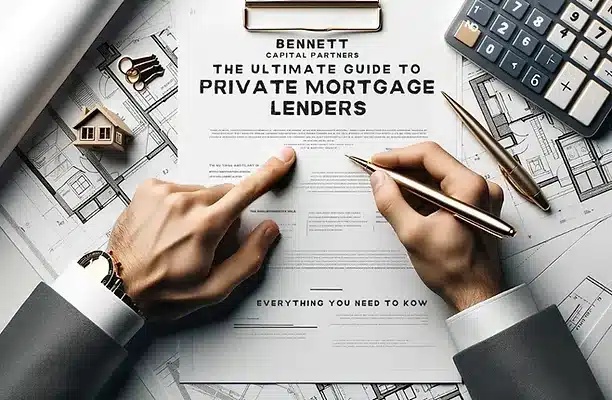Have you been turned down for a mortgage by a bank or lender? Is your situation too complicated for a traditional bank to approve? If that’s the case, a private mortgage might be a solution for you. Before you explore this option, it’s crucial to research and understand it fully.
Private mortgage lenders offer another choice but function differently from regular banks. This blog will explain who these lenders are, how they work, their main eligibility criteria, their fees, and the advantages and disadvantages of using them. We will also discuss the risks of private mortgages compared to traditional lending.
Who Are Private Mortgage Lenders?
Private mortgage lenders are either individuals or private firms that offer home loans using their own funds. They work independently from traditional banks and often have less regulation.
Types of private lenders include:
Individual Investors: People with significant savings who want to earn steady returns through mortgage lending.
Private Lending Companies: Small financial businesses that specialize in mortgages, often targeting specific markets or underserved borrowers.
Mortgage Investment Corporations (MICs): These companies gather money from investors to provide mortgages. MICs enable investors to participate in real estate through collective mortgages without directly managing individual loans.
How Do Private Mortgage Lenders Operate?
Private mortgage lenders take on different risks than banks. They tend to care more about the property’s quality and value rather than the borrower’s credit score. That’s why many private lenders focus on major urban areas where properties are easier to sell.
Here’s how they usually work:
Private mortgage lenders mainly find loans through mortgage brokers. To get a private mortgage, you’ll need to work with a skilled broker who can guide you through the process.
Loan Application: Borrowers complete an application that outlines their financial details and property information.
Property Appraisal: An appraisal is done to find out the property’s market value, which the borrower must pay for.
Loan Approval: Private lenders emphasize the property’s value as collateral more than the borrower’s creditworthiness. They do check identity, employment, and income but are often more lenient than banks. Credit scores matter, but there are minimum standards.
Funding: Once approved, the private lender can often provide the loan faster than traditional banks. Sometimes, they can finalize the mortgage within days of receiving the application. The closing and funding of the mortgage are managed by your lawyer.
Private Mortgage Rates and Fees
Private mortgage lenders generally charge higher interest rates and fees than traditional lenders. A-lenders offer the lowest rates and usually do not have origination fees for A mortgages, with the best five-year A-mortgage rates close to 5%. B-lenders have higher rates and also charge an origination fee, with the best B-mortgage rates around 6.3% and origination fees typically between 1% and 2%.
When working with a private mortgage lender, you can expect:
Interest rates from 8% to 15% or more, depending on factors like risk and the borrower’s profile. An origination fee ranging from 1.5% to 7%. Interest-only payments, meaning you only pay interest and do not reduce the mortgage balance.
Pros and Cons of Using a Private Mortgage Lender
Pros:
Speed and Flexibility: Private lenders can often process loans faster than banks, making them suitable for urgent situations.
Less Strict Requirements: They may offer loans to those with poor credit or unusual financial circumstances and may accept non-traditional property types like raw land or mixed-use buildings.
Custom Solutions: Private lenders often customize loan terms to meet individual needs.
Cons:
Higher Costs: Interest rates and fees are higher, which raises borrowing costs.
Shorter Terms: Loans typically last only one year, although two or three-year terms may be available, requiring quicker repayment or refinancing.
No Amortization: With interest-only loans, there is no reduction in principal, so the amount owed at the end remains the same.
Large Down Payment: Private lenders often require at least a 20% down payment, and in some cases, they may insist on a 35% down payment.
Potential for Unfair Practices: The private lending market is less regulated, which can lead to some lenders using questionable practices. It’s important to read the terms carefully to avoid hidden fees or unfair conditions.
Who Can Benefit from a Private Mortgage?
People who can’t get approval from traditional banks might find a mortgage with a private lender. Here are some common situations:
Unverified or irregular income: If your income isn’t regular or cannot be fully confirmed with standard bank documents or tax returns, it may be hard to secure a loan from a traditional lender.
High debt: Traditional lenders have strict limits on how much debt you can have compared to your income. This may limit your borrowing potential. Private lenders are generally more flexible with these ratios, allowing them to help borrowers who might be turned away by banks.
Low credit score: A poor credit history can lower your credit score. If your score is below what traditional lenders typically accept (usually below 620, or even 680 for insured loans), private lenders might still approve your mortgage.
Property type: Certain types of properties are not accepted by traditional lenders. Private lenders often have more options for these unconventional properties.
Conclusion
Private mortgage lenders can be a good choice for those needing a quick loan or unable to get one from banks. However, it’s vital to understand that private mortgages often come with higher costs and risks. Knowing how private lenders work and carefully reviewing their terms can help you make a smart choice that fits your needs.
If you’re thinking about using a private lender, doing your homework is essential to find a mortgage that meets your financial goals. At Expert Mortgage, we work only with trustworthy private lenders who can offer you fair financing options. For help with your mortgage needs, call us at (877) 357-8787.

